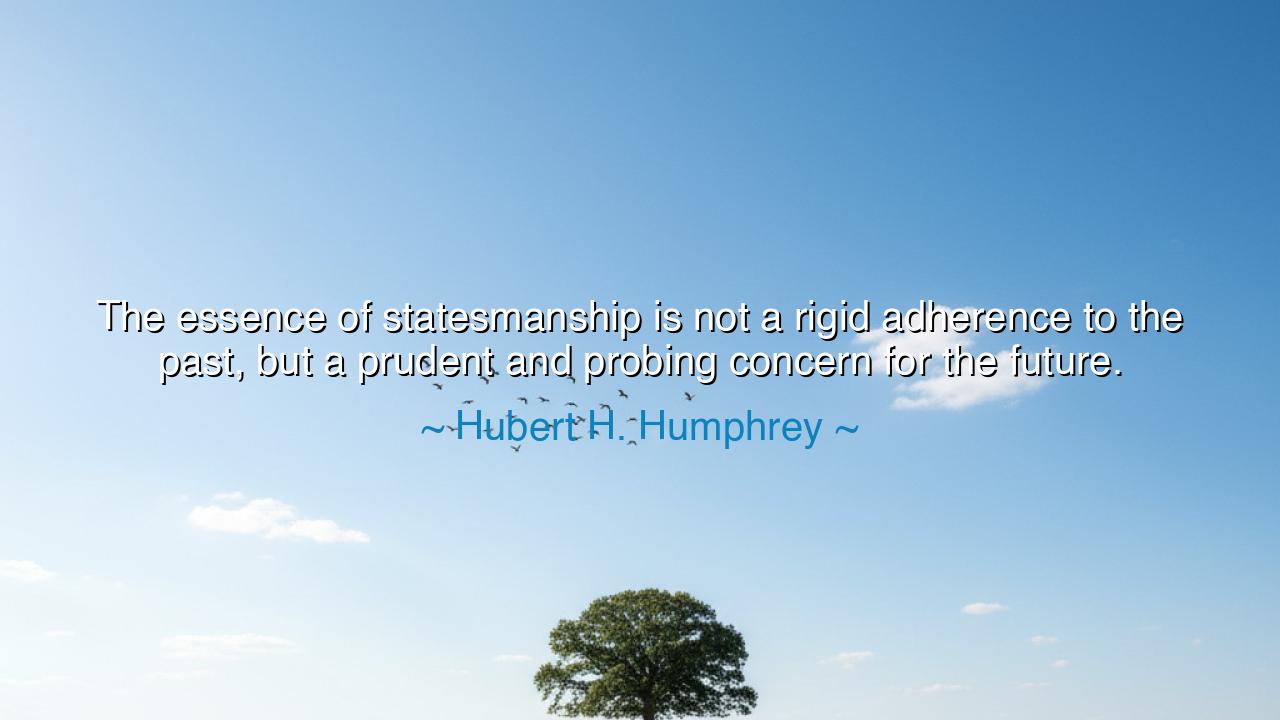
The essence of statesmanship is not a rigid adherence to the
The essence of statesmanship is not a rigid adherence to the past, but a prudent and probing concern for the future.






In the halls of history, the greatest leaders have understood that true statesmanship is not found in the stubborn clinging to the past, but in the wisdom to look toward the future with both foresight and prudence. Hubert H. Humphrey encapsulates this idea when he says, "The essence of statesmanship is not a rigid adherence to the past, but a prudent and probing concern for the future." His words resonate with the deep wisdom of those who have seen beyond the horizon of their own time, knowing that true leadership lies not in the comfort of what is known, but in the courage to navigate the unknown.
The ancients too, recognized this truth. Pericles, the great Athenian statesman, understood that leadership required not only an appreciation for the past—the glory of Athens and its traditions—but also a vision for the future, a belief in the potential for greatness that lay beyond the present. His speeches, recorded by Thucydides, called the people of Athens to action, urging them to think not just of the past triumphs but of the possibilities that could be achieved. Pericles’ statesmanship was not bound by what had been, but shaped by what could be. Like Humphrey’s insight, it was the future that guided his decisions.
In ancient Rome, the wisdom of Cicero echoed similar sentiments. He believed that true statesmanship was about balance—the ability to honor the traditions of the Republic while adapting to the changing times. He wrote extensively about the importance of statesmen who could adapt without losing sight of the enduring values of justice and civic duty. Cicero understood that the future would not be shaped by rigid attachment to the past, but by the ability to respond with pragmatism and foresight to the challenges of the present. In both the Roman and Greek traditions, statesmen were tasked with looking ahead, navigating the tides of change, and securing a legacy for the future generations.
The wisdom of these ancient philosophers and statesmen speaks to a powerful truth: greatness is not achieved by merely preserving what has come before. Consider the life of Alexander the Great, whose conquests were not simply about maintaining the empire he inherited, but about shaping a new world, one that would leave a lasting impact on the cultures of the East and the West. His ability to see beyond the confines of the current era and to imagine a future where he could blend cultures, ideas, and knowledge, was the mark of true leadership. Alexander understood that his actions were not just about preserving a moment in time, but about creating a lasting influence on the world to come.
In more recent history, Abraham Lincoln serves as a quintessential example of statesmanship that probed the future while respecting the past. In the midst of the American Civil War, Lincoln faced the impossible task of preserving the Union while also addressing the moral and political complexities of slavery. His leadership was not defined by a blind adherence to the past, but by his prudent vision of what America could be in the future—an united nation, where all people, regardless of race, could enjoy the freedom and equality that were the nation’s founding principles. Lincoln’s ability to steer the country through its darkest hours while keeping an eye on the future is a perfect embodiment of Humphrey's belief in statesmanship.
Humphrey’s words remind us that in the realm of leadership, it is not enough to preserve the status quo. Just as Julius Caesar was not content with simply leading the Roman Republic to stability, but sought to reshape its future, leaders must act with an understanding of the forces of change and innovation. They must recognize that progress does not occur by remaining stagnant; it comes through reflection, adaptation, and an ongoing concern for the future. History shows us that the greatest leaders are those who are not bound by the past, but who shape the future with boldness and vision.
The lesson we must take from this wisdom is one of balance—honoring the wisdom of the past while looking forward with courage to the future. We must not be slaves to the status quo, but rather, we must find ways to adapt and improve in a world that is always changing. Whether in our personal lives, our careers, or in the larger sphere of public service, we should ask ourselves: How can we shape the future with the same foresight, prudence, and care that the greatest statesmen have shown? It is by probing the future with wisdom, by considering the impact of our actions on those who will come after us, that we can leave behind a legacy of purpose and meaning—one that is truly worthy of the ages to come.






AAdministratorAdministrator
Welcome, honored guests. Please leave a comment, we will respond soon